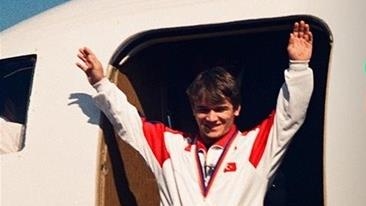ANKARA
Naim Suleymanoglu, a short man with immense power, was one of the iconic Turkish athletes as the “Pocket Hercules” had a big impact on weightlifting but had more influence beyond the sports.
Suleymanoglu, who was 1.47 meters (4-foot-10-inch) tall, went down in weightlifting history by bagging gold medals in three consecutive Olympic Games: Seoul 1988, Barcelona 1992, and Atlanta 1996.
He died of liver failure at the age of 50 on Nov. 18, 2017, and was buried in an Istanbul cemetery.
As Türkiye will mark the 100th anniversary of the proclamation of the republic on Sunday, Suleymanoglu was one of the unique athletes for the country for his achievements and his story, and one of the greatest Olympic weightlifters of all time as Sunday will mark the 100th anniversary of the proclamation of the Republic of Türkiye.
Born to Turkish parents in Kardzhali, southern Bulgaria on Jan. 23, 1967, Suleymanoglu started weightlifting at age 9.
He represented Bulgaria to win the 1982 World Junior Championships in Sao Paulo, which was his first world title, and set his first world record when he was just 15.
Suleymanoglu was named as the world’s best weightlifter in 1984, 1985, and 1986.
He did not compete in the 1984 Olympics as Bulgaria joined the Soviet boycott of the Los Angeles Games.
In the Todor Zhivkov era, the Bulgarian government changed Suleymanoglu’s name – without his consent – to Naum Shalamanov.
The 1980s witnessed systematic state oppression of Bulgaria’s Turkish minority, forcing them to adopt Slavic names and prohibiting their language. The Communist regime in Bulgaria forced Turks to flee to neighboring Türkiye.
The 1988 Seoul Olympic Games saw the birth of a legend.
Suleymanoglu set a lifting record of 190 kilograms (419 pounds) in the clean and jerk in the 1988 Olympics, which was more than three times his body weight. He was the only weightlifter to do so.
He set a world record in the snatch and jerk in the featherweight division, and won a gold medal in Seoul 1988, two years after Suleymanoglu defected to Türkiye in protest.
Escape from communist regime to Türkiye
Suleymanoglu, who was a Bulgarian athlete until 1986, was on a trip with the Bulgarian national team for the World Cup in Melbourne where he won a gold medal.
He was seeking to escape the oppression in Bulgaria.
Once the 1986 World Cup ended, Suleymanoglu risked his life but managed to flee the Bulgarian camp and bodyguards with the help of the Turkish government.
He took shelter in the Turkish Embassy in Australia.
At that time he was called Naum.
In a secret operation, Suleymanoglu was airlifted to London first, then he was brought to Türkiye’s capital Ankara from the UK by a private jet sent by then-Turkish Prime Minister Turgut Ozal.
The Turkish government paid Bulgaria $1 million to have Suleymanoglu compete for Türkiye at the 1988 Olympics, as Bulgaria allowed him to represent Türkiye in international competitions.
After his escape, the world heard about the Bulgarian oppression of the Turkish minority in the 1980s.
World’s best in 1992
Four years after winning an Olympic gold for Türkiye, Suleymanoglu was named the best athlete on the globe by the International Weightlifting Federation (IWF) Press Commission in 1992.
During his career, he won gold medals in three consecutive Olympic Games in 1988, 1992, and 1996.
Suleymanoglu also won seven world and European titles each, and set an astonishing 46 world records.
He failed at the 2000 Sydney Games and retired that year.
Featured on cover of Time magazine, his story filmed in 2019
In honor of his successful performance in the 1988 Seoul Games, Suleymanoglu was featured on the cover of the Oct. 3 issue of Time magazine’s international edition.
“Everybody Wins,” Time said in its headline.
His life was filmed, which was released in 2019.
A Turkish-Dutch actor, Hayat Van Eck, 22, portrayed Suleymanoglu in a drama movie titled “Cep Herkulu (Pocket Hercules): Naim Suleymanoglu.”
The movie also includes his escape to Türkiye over Bulgarian oppression and his victory in Seoul 1988.

